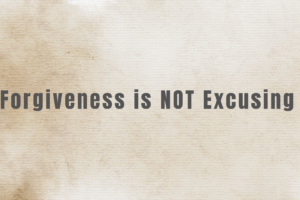We are a people of grief. We live in a world of loss and brokenness. It is inevitable to encounter loss of that which we love. Some of the greatest minds of our day present this idea with sincerity and grace, such as Dr. Curt Thompson, James K. A. Smith, and Mark Vroegop. Such authors portray this truth that we are unable to avoid grief, loss, and sorrow; therefore it is best if we learn what to do with it.
Grief is not cared for well if it is ignored, dismissed, or covered up. Instead, caring for our grief does look like acknowledging it, feeling it, and using it to inform our understanding and placement in the world. If we cannot be without the experience of sadness, then we must learn how to be sad. James K. A. Smith talks about this countercultural idea in his book You Are What You Love. He extends this idea with the thought that one of the best ways we can love our children and shape generations to come is to simply teach them how to be sad.
For the Christian, this principle is found all throughout Scripture. Entire books of the Old Testament are records of how the people of God lamented before Him in the midst of their separation and suffering. Other biblical narratives point towards the practice of lament, like many of the Psalms of David or the cries of Job.
We must recognize that God has not left us in our loss and grief. He cares so deeply for us, even in the fragmentation we experience being separate from Him. Yet, many of us do not have a well working understanding of this concept. Lament is not a common topic being taught from the pulpit, theological institutions are not producing curriculum for their classrooms, and families are not discussing it at the dinner table. How are we to learn how to practice lamenting if it is not discussed?
One model of group therapy I am trained in, called New Hope, teaches the practicality of lament through the story of the woman with the issue of blood recorded in Mark chapter 5. When we look at this story, we see how the woman told her story to Jesus and how her faith made her well. There are many things in this story I could draw attention to (that’s why this group I mentioned lasts 2.5 hours), but one tangible formula we can deduce is the way in which we can begin to lament before God. It can follow a pattern similar to this:
God, this happened to me…
This is how it made me feel…
This was the worst part of it…
But, God, I believe (or want to believe) this truth about you…because I know (or because I have heard) these things about you…
Lamenting is an experience between the believer in Christ and God directly. It is a confession of experience, pain, loss, grief, regret, and sin, followed by a confession of faith or hope. By this definition, lamenting is a more holistic approach to confession because it is followed through with that fourth element, faith.
God cares deeply about our experience, emotions, and thoughts within our grief and loss. As Christians, we have access to healing that the rest of the world seeks in vain. One does not have to know God in order to share their story and identify their emotions. What truly sets us apart is our confession of faith. This is why lament is different than complaining or airing grievances; it is an act that brings us within closer unity to our God who hears us.
Your practice of lamenting does not have to be dry and sterile, but by following this formula you have the beginning to your ever developing art. Have you ever wondered how many Psalms of David were written and discarded? Yet we still have 150, in total, that we read and study today. Once you begin, the more you practice lamenting, the more it will become integrated into your being.
There is great healing that can come from presenting such vulnerable expressions towards God and choosing to integrate our faith into them. We can learn to share our story with the One who is perfect at listening, just as we seek to do with those proximate to us. You might have had the experience of immediate relief when you share something heavy with a friend or therapist. However, even those of us that are well trained are still limited in our listening. I wonder what it would look like if you recognized the presence of the Lord in your confession.
As people of grief we still have steadfast hope in the Gospel. We are not bound to our loss, sorrow, or trauma. There is absolute freedom in Christ and He is gracious to reveal to us the process in which we get there.






Recent Comments